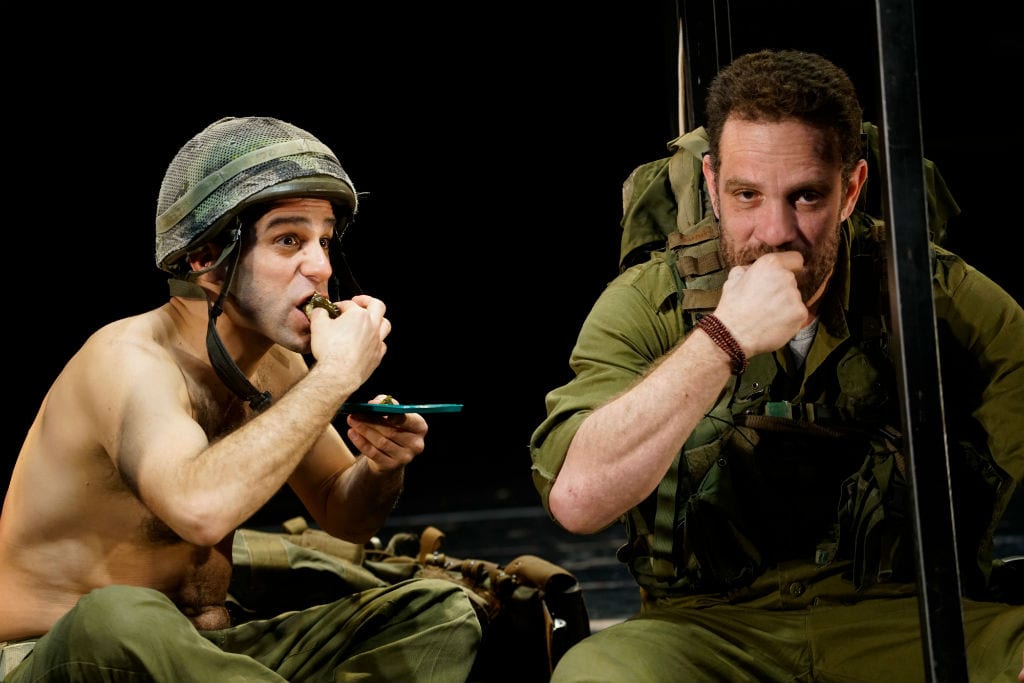When you walk the streets of Tel Aviv at night, you hear the roar of people out socializing at every bar and sidewalk cafe. And that’s on a Monday night or a Wednesday, not just on weekends. There is a non-stop, exuberant, expressive vibe that permeates life and therefore theater here.
We were here to cover International Exposure of Israeli Theatre, a program attended by artistic directors from theaters in twelve countries, from France to Turkey to South Korea, shopping for works to bring to their local audiences.
It was five exhausting days of almost nonstop performances and meetings with Israeli playwrights, directors, and performers spanning outstanding narrative dramas, such as those based on the award-winning novels of David Grossman, to myriad vibrant inventions of the experimental or “fringe” variety. The impression it leaves is one of an artistic community that is bold to the point of fearlessness, restless to create new forms, intensely personal, and inevitably political.
The Inevitable political
Israeli theater seems to be a gathering point for the voices of dissent within the Hebrew-speaking Jewish majority, frustrated and alienated by the current government’s seeming acceptance of continuing West Bank occupation as its best security option. This is not the generation of the Holocaust survivors and Middle Eastern and North African Jewish refugees nor their idealistic, native-born Sabra sons and daughters. It’s a new generation raised in Israel after decades of conflict. They have tremendous artistic confidence, but in it they express political fear and anxiety, distrust of authority, and distress about rising extremism and the precariousness of living a good life in a country seemingly without prospects for peace. Israel is their home, but they are clearly not at home with the status quo–politically or artistically.
In The Tunnel (במנהרה)
There were explicit explorations of the conflict, like the cunning satire In The Tunnel by Roee Chen. This big stage production at the Gesher Theatre finds two Hamas fighters and two Israeli soldiers trapped together in a firefight in one of the tunnels built by Palestinians under the border of Gaza. The “I’m in control now/you’re in control now” inversions alternate until their common need for survival leads to some shared good, even giddy moments, very wittily rendered by Chen. This storyline is punctuated by visits to the world figuratively above the tunnel, a plastic-y cheerful daytime TV studio where politicians will eventually appear in order to exploit the situation. On the way into the theater, audience members vote between two endings, one where there is light at the end of the tunnel and one where there is no light at the end of the tunnel. “The vote is so far running 70 percent for light at the end of the tunnel,” Chen tells us.
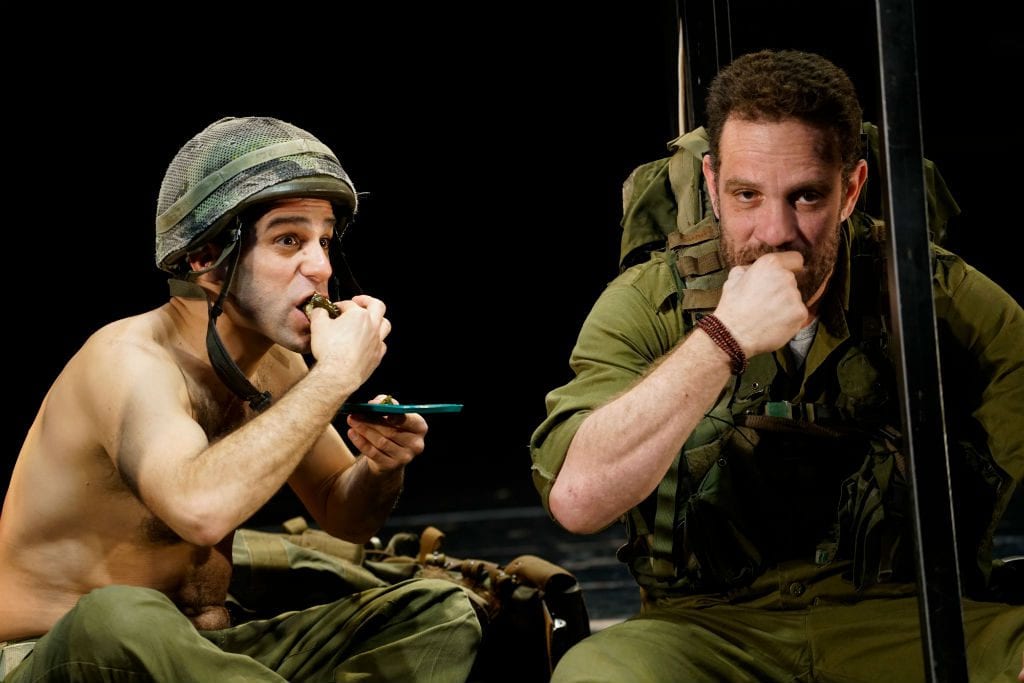
Release Day (שחרור)
In Release Day by Shay Goldstein, we are asked to imagine that a degree of friendship and mutual respect has developed between a Palestinian military prisoner and his Israeli guard over an eighteen-year incarceration, despite dangerous tussles for control. I asked Palestinian actor Morad Hasan who portrayed the prisoner Amin how Arab audiences would react to the show. “In Israel, you really must decide first if you are working in Hebrew or Arabic,” he explained. “This play would be very different if it were done for an Arabic-speaking Palestinian audience. There wouldn’t be this kind of relationship between the prisoner and an IDF guard. They wouldn’t talk about their wives and families. The Palestinian would not view himself as below the guard. He would be portrayed more as a hero.”
Most productions commenting directly or indirectly on the conflict used metaphors suggesting a futile, ill-fated struggle between equivalents–like Spy vs. Spy from old Mad Magazines.
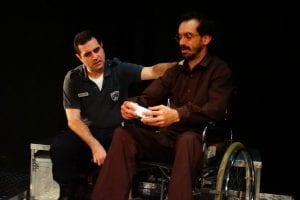
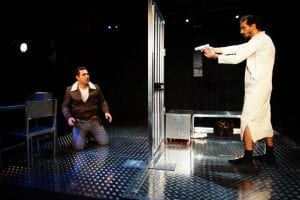
Food Fight
There was the madcap Food Fight created by Nitay Shalem and Sivan Presier, where, as a pair of combatants on opposite ends of a huge rooftop stage, they frenetically cook up clever, food-based armaments in their separate kitchen/bunkers while a clock counts down five minutes in Top Chef fashion. Then the pizzas fly and the bell pepper bombs burst in air to an amplified battle soundtrack.
Cut.Loose חיתוך. דיבור
Cut.Loose, takes a more poetic and artistically ambitious tack, in which Neta Wiener and Stav Marin engage in a highly stylized, somewhat kinky, sado-masochistic martial arts match surrounded by spectators. They trade self-defence class instructions at each other as if they were erotic commands, wielding realistic-looking knives and aggressively planted kisses through elaborate attacks, repulsions, and rests.
SurFace (פני שטח )
In SurFace, a refreshing experimental work by Nofar Sela, she personally embodies Israel while drawing with charcoal and reclining on a huge square of paper on the floor, intimately surrounded by audience members. She engages in a dialogue with us throughout, calmly asking questions like “Do you love me? Would you still love me even if I got dirty?” It was group therapy with a light touch. For the Israelis in our group, responses tended to fall under the category “It’s complicated.”
To The End of The Land (אשה בורחת מבשורה )
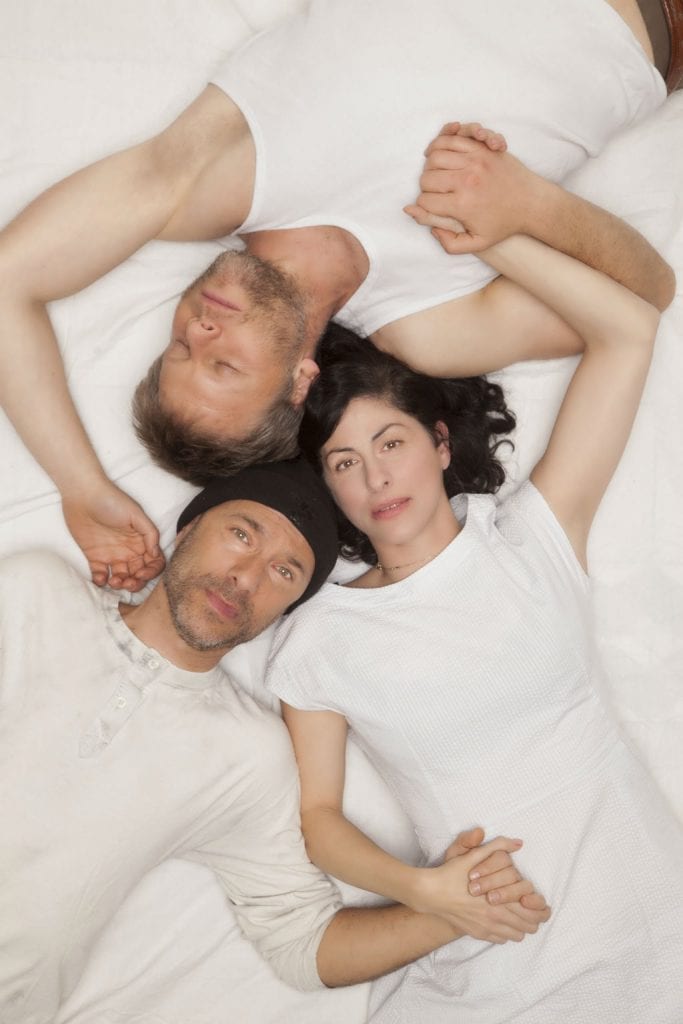 In To The End of The Land by David Grossman, the major standout work of the exposure, Israel’s decades of militarization are explored from the point of view of an Israeli soldier’s mother, herself a former teenage soldier from the 1967 Six-Day War era. She is locked in an intense triangle of faithful friends from that army experience, all of whom have a stake in whether her son will survive a 28-day extension of his military service. His job is to “take a bomb” at a border crossing if necessary, rather than have it detonate in Tel-Aviv. In an unforgettable dramatic aria, while furiously chopping vegetables to make her son an Arab salad before redeploying, she lists and curses the name of every famous battle, massacre, and Arab leader then names a string of Israeli prime ministers, crying “Don’t they have blood on their hands too? Did they do everything they could to make peace?” The audience erupted in applause.
In To The End of The Land by David Grossman, the major standout work of the exposure, Israel’s decades of militarization are explored from the point of view of an Israeli soldier’s mother, herself a former teenage soldier from the 1967 Six-Day War era. She is locked in an intense triangle of faithful friends from that army experience, all of whom have a stake in whether her son will survive a 28-day extension of his military service. His job is to “take a bomb” at a border crossing if necessary, rather than have it detonate in Tel-Aviv. In an unforgettable dramatic aria, while furiously chopping vegetables to make her son an Arab salad before redeploying, she lists and curses the name of every famous battle, massacre, and Arab leader then names a string of Israeli prime ministers, crying “Don’t they have blood on their hands too? Did they do everything they could to make peace?” The audience erupted in applause.
Of course the true voices of dissent would be those of the Israeli Arab community, close to a quarter of the population who refer to themselves as Palestinian in solidarity with those living under the Palestinian Authority. There was a smattering of Palestinian Arab performers across the program. But there were no Palestinian playwrights or predominantly Arab companies that were even interested in submitting to participate in a government-supported event. One Palestinian actor explained that it might appear to normalize the status quo or suggest a spirit of Israeli-Arab dialogue to an international audience, a representation in which they have no interest.
Searching for a new visual language
We heard a lot about the tension between “repertory” and “fringe”, i.e. narrative drama versus works in the range of performance art, puppetry, object theater, and physical theater. And there is an explosion of creativity in Israel in these fringe idioms. We heard from several creators that Israel is too young to have any kind of established theater traditions. So the artists feel it’s up to them to stretch and explore, to find new ways forward that will be distinctly theirs.
Gulliver (גוליבר)
One of the productions we saw at the new HaBait Theater in ancient and increasingly hip Old Jaffa was Gulliver, adapted from the Jonathan Swift satire by Zvi Sahar. It’s one of those performances we see occasionally that’s staged in a shallow pool of water. But the charming and inventive combination of puppetry and live video steal the show. Sahar intones his story as a traumatized witness to inhuman treatment while tiny boots walking through his chest hair are projected on the big screen, or while huge brobdingagian faces torment and toy with him.
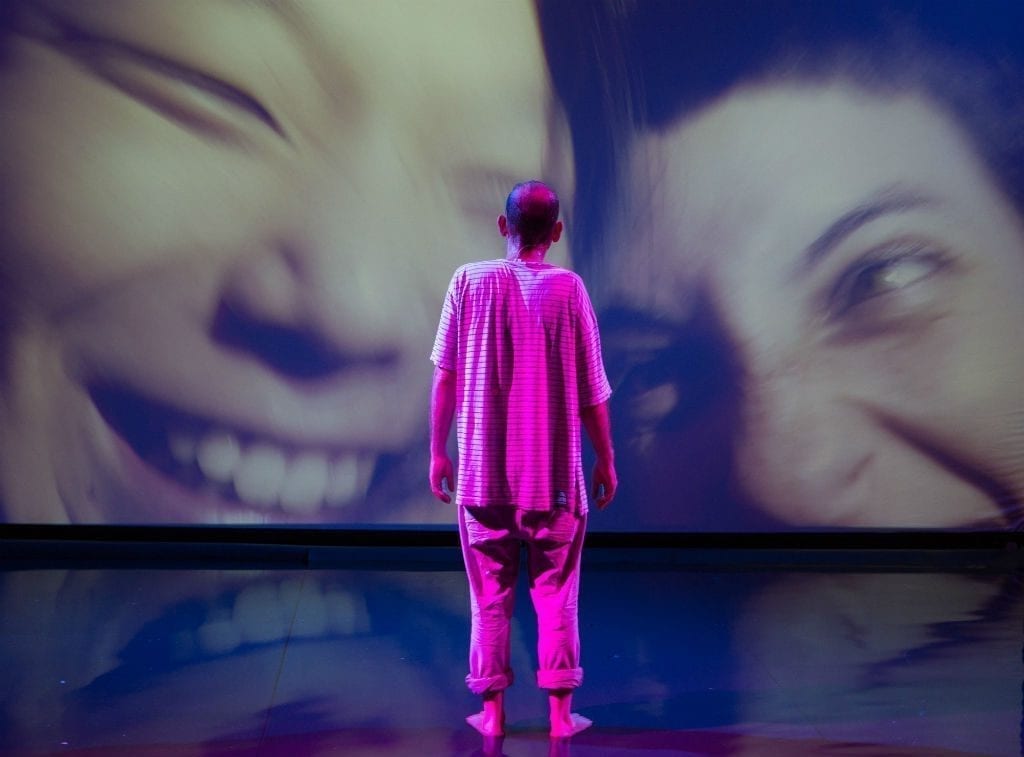
Aquarium (אקווריום)
In fringe standout Aquarium, created by Ronnie Brodetzky at Haifa Municipal Theatre in the north, an ensemble of young men and women in retro fantasy colored bathing suits, water wings, and bathing caps appear to be relaxing and playing in an eternally blissful swimming pool. They do both synchronized “swimming” in the shimmering, waterless pool as well as lip-synching to dialogue from original interviews with a group of elderly Israeli men and women. Hearing the voices of elderly people through young bodies makes us listen more intently. Brodetzky says she learned that everyone is interested in sex. But she also found that the undertow to all the conversations was death.
There was an extra resonance to Aquarium for native Israelis in the audience who could see their national history reflected on a very human scale. The elderly Israelis interviewed were originally immigrants from a variety of countries whose accents in Hebrew are very distinctive–Polish, French, Iraqi, etc. To young Israelis, old people typically have accents. Israel was a haven for their grandparents, then it became a melting pot as that generation married and had children. The one elderly participant who spoke with a true Israeli accent to them “sounded young”.
It must be said that most of the foreign artistic directors present seemed more interested in bringing these fringe-type works to their theaters. We were impressed by much of what we saw in that range. But as you might expect from PlaysToSee reviewers, we really enjoy, well, seeing plays.
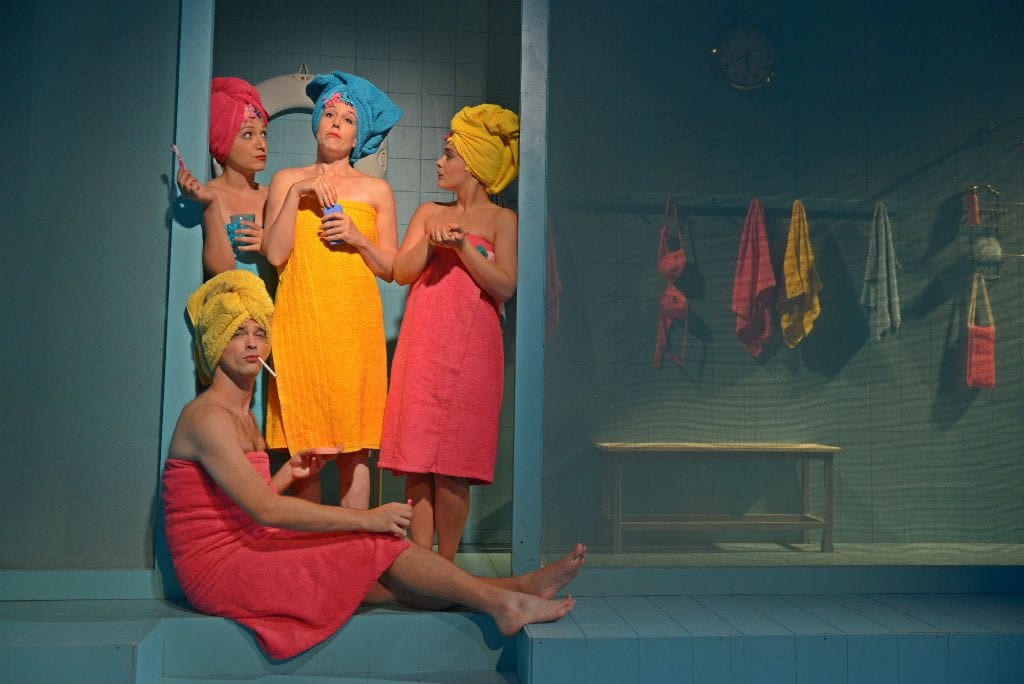
A Horse Walks Into A Bar (סוס אחד נכנס לבר )
In the “actual play” range, adaptations of David Grossman’s novels were represented twice and did not disappoint either time. In addition to To The End Of The Land, we had A Horse Walks Into A Bar. In it, first rate actor Dror Keren commands the stage as Dovaleh, an established working comic–not a star. He’s in a club in a not-star-level Israeli city giving a kind of swan song stand-up performance. We are the audience on the night when it all gets said, as he tries to sort out the pain and trauma that has made him who he has become. It’s a wrenching, compelling performance by Keren, who we came to regard as something like Israel’s Mark Rylance. Amazingly, in the same week he also co-starred as the damaged but upbeat Avram in To The End Of The World.
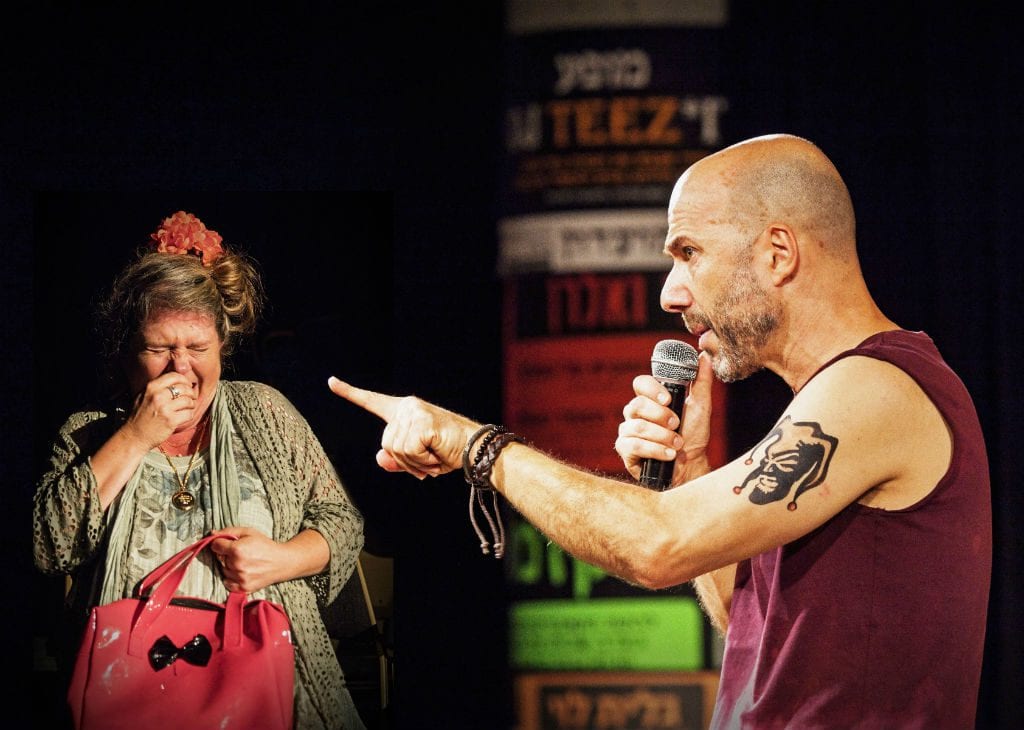
The Picture of Dorian Gray (תמונתו של דוריאן גריי)
Less successful was an adaptation of Oscar Wilde’s novel The Picture of Dorian Gray at Habima, Israel’s national theater, by Yehezkel Lazarov. And when we say “by” Lazarov, he adapted it, directed it, designed the staging, choreographed and starred in it. We learned this is the fourth such production for the gifted theater polymath. Lazarov tells us he feels this message of corruption of something that was once beautiful is especially important in Israel’s present environment. Once again, the political is present.
It’s stylish and swank, with filmic performances, rapid scene changes, and Lazarov in the lead as Dorian in stunning interstitial dance numbers. He has disassembled Wilde’s story and run it backwards so we can find our way back from a corrupt, ugly present self back to a younger more innocent self, perhaps to leave the theater inspired to make different choices. Unfortunately that means we start without sympathy for an unlikable character for quite some time, and there’s a whole lot of exposition. A worthy storytelling effort, but it’s tough to improve on Wilde.
From the political to the very personal
Many Israeli artists seemed driven to reveal themselves in boundary-shattering ways, almost as a mark of bravery. In Not Letting It In – The Exposure, created by Jason Danino Holt, four actors sit at a table and generate supposedly true confessions they share aloud. It takes place over a four-hour period during which audience members are invited to come and go as they please as well as to join in and share their own confessions. In addition to that kind of exposure, near nudity was a factor in several productions. In Schreber by Ran Bethor, the title figure being kept in a mental hospital is by turns stripped, immersed in an ice bath, bled, and made the object of target practice with tomatoes.
Several inventive works were grouped together into a blistering and at times highly personal exploration of the topic of sexual assault, covered here.
Fun too
Lest you think it’s all too too earnest, we were also treated to Under Construction by the Davai Group, a cracked, cockeyed visit with a trio of zonked clowns (Vitaly Azarin, Losha Gavrielov, and Fyodor Makarov) who bit by bit take their home apart. They get pretty close to naked in the process,too.
Radio Play
And in Radio Play by Noa Becker, we get a tongue-in-cheek play staged as if for radio, adapted from an over the top, actual Cold War-era Israeli spy novel. It’s got a Bond-like hero, an evil villain, a bombshell French spy, and a clever parade of novel sound effects by sound designer Noam Rubinstein. Flashbulb popping sounds are made with an umbrella, a hair dryer makes it sound like we’re aboard an airplane, and on and on. The fun is seeing what he’s going to do with whatever he just picked up.
All of this just scratches the surface of an incredibly vibrant theater scene in a city that’s like a cross between Brooklyn, Lincoln Center, and Miami Beach. In one two-hour session we had brief meetings with the creators of 21 other productions, all truly as intriguing-sounding as the performances we actually saw. They’re not all actually in Tel Aviv, but this is a country smaller in area than the Dallas-Fort Worth Metroplex, so everything is accessible.
We fully expect much of this stunning output to come to a theater festival near you. Go. Talk with the artists if you can, too. They have a lot to show, and a lot to say.

